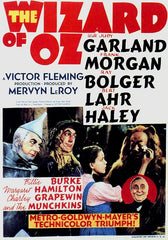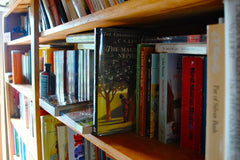Great Literature Versus the Blockbuster Film
by Bethany Wagner

We are in an age of transforming books into films. As soon as a new action or young adult novel hits the best-seller shelves, the rights to a film are in the works, fans speculate on the choices of actors, and after a couple years of production, a new movie presents the story of the novel on the big screen in a dazzling array of special effects.
Film is, of course, a work of art in itself. Through acting, incredible effects, locations around the world, and technological advancements, viewers can experience the worlds of Hogwarts, Middle-Earth, Narnia, and Oz like never before.
And yet books still offer experiences that films cannot replicate.
First, a book represents a partnership between the author and reader. With just lines of text to guide, the whole of the setting and story plays out in the reader’s imagination. Before we saw Peter Jackson’s The Fellowship of the Ring, we each had a different idea of what the great fortress, running waterfalls, and scented gardens of Rivendell looked like. The cackle of the Wicked Witch of the West in L. Frank Baum's The Wizard of Oz sounded different to each of us. And while Jane Austen may have told us Mr. Darcy was tall, handsome, and noble, he nevertheless took a different form in each of our minds. Together, author and reader created the story.
Meanwhile, movies are more passive experiences. Yes, you may get caught up in the drama, find your heart racing during suspenseful moments, shed a few tears, and leave the theater in awe. But as the images pass by our eyes and sounds enter our ears, our imaginations rest. We instead watch the work produced by the imaginations of the directors, producers, and actors.
A film adaptation is one interpretation of a book, but there are as many other interpretations as there are readers. We see this in the continued retellings of classic books in films. For example, in 1995, BBC released a television drama of Pride and Prejudice starring Colin Firth. Though the definitive Austen film adaptation for years, a decade later Focus Features premiered a new Pride and Prejudice film following the same story closely, but with an entirely different cast, soundtrack, and feel.
And yet each reader who picks up Pride and Prejudice and enters into the text will imagine the sights and sounds and emotions slightly differently than the next, making the experience their own.
In this sense, a book invites the reader to work. As we read a story’s words, our mind labors at deciphering their meanings, casting a mental image of the scenes and characters, and even running ahead trying to guess what might happen next. It is the exciting work of figuring out what Dickens meant by that mysterious allegory and trying to solve who killed so-and-so before Sherlock Holmes does. Most of all, it is the work of finding how your story—where you come from, who you are, what you believe—fits into the story you hold in your hands.
Some questions are harder to answer than others, one book more difficult to place yourself in than the next, but all pull the reader into the story, and all call the gears of the mind to work—not to monotonous drudgery, but to a satisfying work that engages the imagination.
Especially in today’s age of artistic breakthroughs and new technology, films are stunning creations that can whisk you away to new realms. Well-done film adaptations of books can enhance the experience of the story, bringing to light new elements, expressions, and meanings, so that when you return to the book, the halls of Hogwarts seem grander and the love between Elizabeth and Mr. Darcy seems stronger.
But only the experience of reading a book fully engages the mind and imagination, calling the reader to enter its story as co-creator.

In the upcoming blog series, we will explore each week a different book and its film adaptation, from The Lord of the Rings to the Harry Potter series. Dive into the books behind the films at open-lore.com, where you can find accessible versions of literary classics or Bookshare to find the most current, popular titles.
Bethany Wagner is a freelance writer from Portland, Oregon. She earned her B.A. in English from Azusa Pacific University.
--
Harry Potter and the Sorcerer's Stone movie poster © 2001 by Warner Bros. All Rights Reserved.
